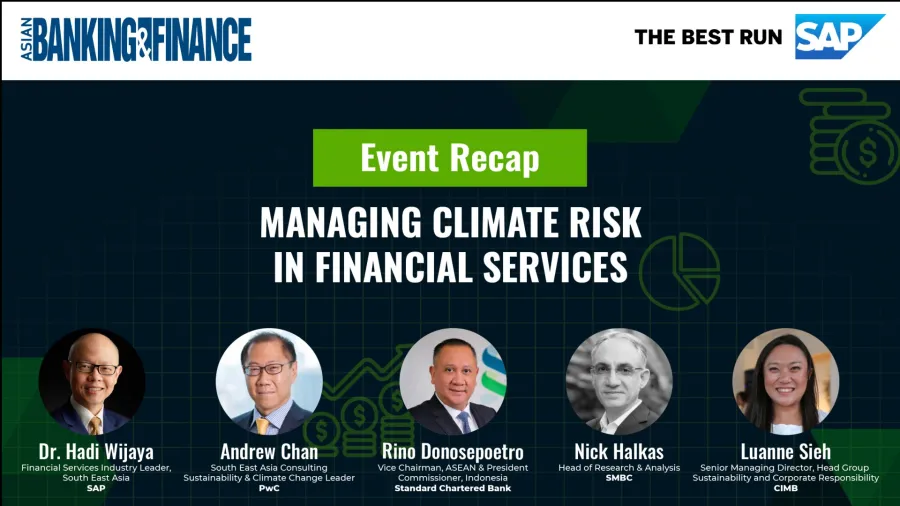
How financial firms can take climate action beyond CSR campaigns
SAP tells Asian Banking and Finance how to manage climate risks in the financial industry.
The worsening climate crisis is undoubtedly being felt across the globe and it is skipping no one. Sustainability drives are being thrown left and right by governments and businesses in every industry, even finance, to pitch in mitigating climate change.
In a virtual roundtable, hosted by Asian Banking and Finance, SAP gave a closer look at how climate-related challenges hit financial institutions, as well as shared its expertise in managing climate risks with its technology and environmental, social, and governance (ESG) solutions.
Hadi Wijaya, financial services industry leader, South East Asia, SAP, said that for the first time the top five global risks are all related to climate change.
“We’ll have a massive disruption in our economies that is increasingly becoming interconnected,” Hadi said.
“So as intermediaries and providers of capital, we believe that banks, especially, play a critical role in this area.”
Hadi said that the growing concern amongst banks is evident as 52% now view climate change as a key emerging risk in the next five years, much higher than 37% in the previous year.
Banks are also increasingly responding to demands around sustainability through corporate purposes.
Managing Climate Risk
In light of this, Hadi outlined three strategic imperatives for managing the climate crisis, identified by SAP – safeguarding the business from uncertainty, financing a green agenda, and focusing on the enablers.
He explained the first one is concerned about managing the financial exposure and protecting and preserving their business value.
The second look into ways in which financial institutions can tap into the opportunities in the green market; whilst the third is about building enablers, a key role of SAP.
“As digital solution providers for close to 50 years, we've been running the most critical business processes across the supply chain and industries,” he said.
“We enable them from the front-office operation, like in sales, marketing, customer experience, to middle-office, product management, and core banking, and also to the back-office operation like accounting, finance, risk, human resources, and procurement.”
Over 16,000 financial services companies, be it in retail banking, insurance or asset management, run with SAP and 97% of banks named in Forbes 2000 used the SAP in their system, as well.
SAP uses a holistic strategy, which it calls the Intelligent Banking Enterprise, to advise its clients. The strategy seeks to help companies digitise and integrate cross-company business processes, and address complex challenges in business, social, and environment.
It also provides a business technology platform for integration, innovation, and extensibility, and cloud infrastructure that allows banks to scale the system landscape.
“So overall, this holistic strategy helps our banking customers not only to manage climate risk today, or in the next 10 years, but also to deal with a broader disruption in the industry,” Hadi said.
Walking the talk
But this is just one of SAP key roles, as he had highlighted, the company is not just an enabler, it is also an exemplar.
Hadi said the company’s ESG principles are well-embedded in its business practices as it uses its own technology, allowing them to experience first-hand and gain the learning to benefit the customers.
He noted that SAP’s push towards sustainability started a decade ago, during which it launched greed cloud to power data centres, and zero waste initiatives amongst others.
“ESG in SAP is not about a big bang, one-off project. We see it as a journey, learning a process of change management, permeating across every function to bring the targeted impacts on economic, environmental, and social aspects of our business,” he said.
Andrew Chan, PwC's South East Asia Consulting Services Sustainability & Climate Change leader, observed this change in perception is evident in the actions that executives are now taking.
“We're seeing commitments from businesses’ realisation that we need to take more of a lead on climate change and societal issues. And what we've seen in the region in particular, are paradigm shifts,” he said during the roundtable discussion.
As a value integrator, PwC's Sustainability practise helps organisations plan, source, deliver, finance and measure the wider impact of products and services. PwC uses a spectrum that scales the sustainability ambition of financial institutions in their ESG journey, beginning with sceptics, pragmatists, strategists and idealists.
“Where do you think your organisation lies, and where should it target?” he said. On top of this, PwC’s corporate sustainability framework differentiates enterprise sustainability and sustainable financing responses.
Under enterprise sustainability, PwC focuses on the stance of the enterprise on sustainability and how it reports ESG data; whilst the latter is more concerned on the efforts of the company towards sustainable financing.
On the ground
Climate-related disclosures are, however, challenging due to data issues and technical barriers, amongst others.
Andrew raised amongst the common hurdles companies encounter are the lack of data availability, uncoordinated internal and external engagement, and difficulty in identifying financial impact.
“Data is always a challenge when we’re looking at ESG, especially on climate data, not just from your clients but from governments. Climate data in this region is not readily available or standardized,” he said.
“There are many different ESG data providers. But you need to go under the surface and look into what that data means.”
Panelist Luanne Sieh, senior managing director, head of Group Sustainability and Corporate Responsibility, CIMB, shared a similar challenge in accessing data, particularly from smaller companies.
CIMB embarked on the sustainability journey just last 2019, but last year the company had kicked off plans to deviate from funding coal-fired power plants.
“At the end of last year, we announced that we would no longer be funding any new coal-fired power plants of any type in any location,” Luane said during the panel discussion.
“And also no new and expansion of thermal coal mines. And we've committed to exiting coal entirely by 2040.”
For Standard Chartered Bank, the commitment is towards attaining net-zero carbon emission from its operations by 2030 and net-zero from its financing interests by 2050.
Rino Donosepoetro, vice chairman, ASEAN & President Commissioner, Indonesia, Standard Chartered Bank identified the four roles of financial institutions in attaining sustainability.
This includes advising clients and supporting their transition to a more sustainable business model, providing innovative products, acting as a catalyst for sustainable financing and demonstrating how Standard Chartered itself made its operations greener.
For SMBC, Nick Halkas, head of Research and Analysis, the approach also focuses on internal management, ensuring the organisation understands the goal.
“What we want to do is to embed it into the organisation, we actually need to get each and every employee to understand it and embrace it,” he said.





![Cross Domain [Manu + SBR + ABF + ABR + FMCG + HBR + ]](https://cmg-qa.s3.ap-southeast-1.amazonaws.com/s3fs-public/styles/exclusive_featured_article/public/2025-01/earth-3537401_1920_4.jpg.webp?itok=WaRpTJwE)
![Cross Domain [SBR + ABR]](https://cmg-qa.s3.ap-southeast-1.amazonaws.com/s3fs-public/styles/exclusive_featured_article/public/2025-01/pexels-jahoo-867092-2_1.jpg.webp?itok=o7MUL1oO)








 Advertise
Advertise






